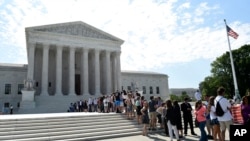In a case touching on one of the most prominent issues on the minds of Americans, the U.S. Supreme Court has refused to loosen federal restrictions that prevent people with domestic assault convictions from owning guns.
The 6-2 ruling Monday was a victory for gun control advocates who have increased their efforts following this month's mass shooting at a nightclub in Orlando, Florida.
The case dealt with two men who hit their partners and were found guilty of misdemeanor domestic assaults in the state of Maine.
A federal law makes it illegal for anyone with that type of conviction from possessing a gun.
But the men argued they were not subject to the ban since they hit their partners in the heat of the moment, as a so-called "reckless" act, rather than as intentional, planned behavior.
The court rejected those claims, saying Congress' definition of "misdemeanor crime of violence" contains no exclusion for convictions based on reckless behavior.
"A person who assaults another recklessly 'use[s]' force, no less than one who carries out that same action knowingly or intentionally," read the majority opinion, authored by Justice Elana Kagan.
Dissenting opinion
In a dissenting opinion, Justice Clarence Thomas focused on language within the federal law that defines misdemeanor crimes of domestic violence as involving the "use of force" against the victim.
According to Thomas, a "use" of force is "an inherently intentional act — that is, an act done for the purpose of causing certain consequences or at least with knowledge that those consequences will ensue."
Thomas, who was unusually outspoken during oral arguments in the case, also questioned whether misdemeanor violations should mean someone is stripped of their constitutional right to own a gun.
"We treat no other constitutional right so cavalierly," said Thomas.
Reactions
Gun rights groups were not happy with the ruling.
"Violent abusers should be in jail for felony abuse, but this federal law punishes misdemeanors, and hence, is way too broad," said Erich Pratt, executive director of Gun Owners of America.
"A principle in law is that the punishment must fit the crime. Sadly, permanently disarming Americans for slight infractions that impose no jail time is simply not just," Pratt said in a statement to VOA.
But the ruling was praised by some groups that work to prevent domestic violence.
"We are very, very pleased," Ruth Glenn, the executive director of the National Coalition Against Domestic Violence. "Any time there's any act of domestic violence, it's imperative we address it by removing firearms."
"As we've seen in the Orlando case and other cases, oftentimes domestic violence is a prerequisite to other actions," she told VOA.
She was referring to Omar Mateen, the gunman who opened fire in an Orlando, Florida, gay night club earlier this month, killing 49 people. Mateen's ex-wife said he frequently hit her, though he had never been convicted of the crime.
In the United States, misdemeanors are crimes that generally carry punishments of up to one year in prison. More serious crimes, called felonies, carry longer sentences along with the loss of certain rights, such as owning a gun, serving on a jury, and voting.
The U.S. Court of Appeals, one step below the Supreme Court, ruled against the defendants in Voisine v. the United States in 2015. The Supreme Court also ruled in 2008, while affirming a Second Amendment right to gun ownership, that there are limits.




